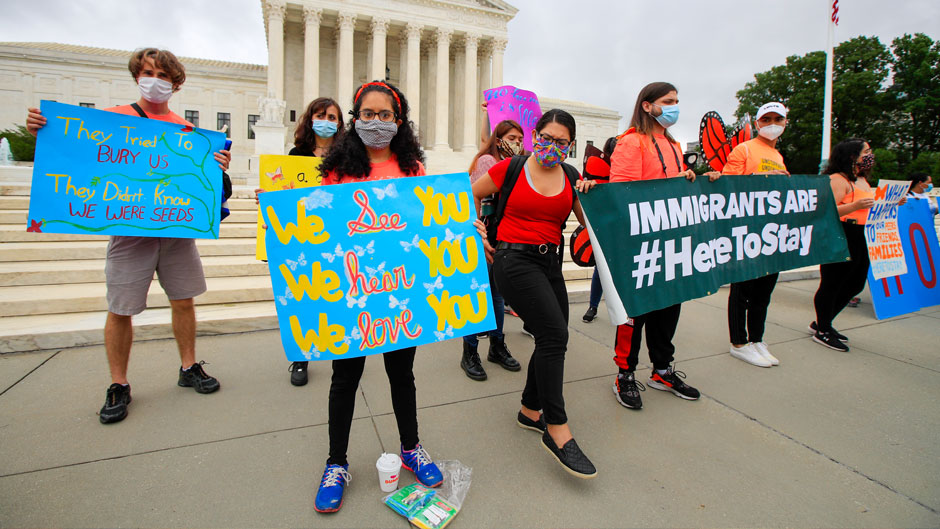A year before the U.S. Supreme Court rejected the Trump Administration’s push to end Deferred Action for Childhood Arrivals (DACA), a University of Miami alumna was looking into how the policy’s recipients were instrumental to the United States.
Vanesa Lougheed’s dissertation, “The Economic Effects of DACA and State Policy on Undocumented Students and Society,” which earned her an Ed.D. in Higher Education Leadership in May 2019 from the University’s School of Education and Human Development, measured how DACA recipients—or “Dreamers,” nicknamed from the Development, Relief, and Education for Alien Minors Act, known as the DREAM Act—with college degrees have contributed significantly to tax revenue generation in their states of residence.
She found that states that allowed these DACA—an immigration policy that deferred deportation for children who were brought to the U.S. illegally—students to pay in-state tuition saw higher increases in college enrollments and vehicle ownership than states without such a policy.
 “I was drawn to this study because my own parents and siblings entered the United States legally from Nicaragua under tourist visas. They came to this country fleeing their native land that was being ravaged by communism and a civil war. When the visas expired, they remained in the U.S., becoming undocumented,” she said, adding that in the 1980s the family was afforded the opportunity to become legalized under special legislation. “But had that not occurred, they would all have remained undocumented,” she pointed out.
“I was drawn to this study because my own parents and siblings entered the United States legally from Nicaragua under tourist visas. They came to this country fleeing their native land that was being ravaged by communism and a civil war. When the visas expired, they remained in the U.S., becoming undocumented,” she said, adding that in the 1980s the family was afforded the opportunity to become legalized under special legislation. “But had that not occurred, they would all have remained undocumented,” she pointed out.
The importance of Lougheed’s work resurfaced last month after the Supreme Court’s June 18 decision that the government had not given adequate reasoning for ending DACA.
Lougheed, who was born in the U.S. and now works for Nova Southeastern University as associate controller, said that many people view Dreamers as slackers and not as contributors to society.
“It was important to show a positive side of the DACA students,” she said. “Many people have a bad image of the DACA students, but many of them came to escape some very harsh conditions in their countries.”
Once here, Lougheed’s study showed, many of the Dreamers persevered and contributed to U.S. society.
Lougheed began her research around the time that the Trump Administration decided in 2017 to end the DACA program and its education and employment opportunities for more than 700,000 undocumented immigrants.
The dissertation used aggregated data across five years from the U.S. Census Bureau, National Center for Education Statistics, and other government databases to examine two research questions: 1) Does DACA policy affect states’ rate of return on investment as measured by tax revenues compared against initial state investments, from pre-DACA implementation to post-DACA? and 2) Are there state-level factors that explain differences in states’ rate of return on investment over time? A series of mixed-effects models were employed to answer the questions using complex datasets, she said.
“Research is crucial for providing empirical information to state and federal policymakers, especially today, when emotions seem to hinder fact-based approaches to problems,” Lougheed explained.
Her dissertation was done under the supervision of two content and methodological experts—Carol-Anne Phekoo, associate clinical professor, Higher Education Leadership, and Soyeon Ahn, professor and chair of the Department of Educational and Psychological Studies. “Vanesa’s research was complex and painstaking work. We’re proud of her, as we are of all students who strive to achieve understanding that benefits people and society,” said Phekoo.
President Obama signed DACA into effect in 2012 as an executive order that provided limited protections to immigrants brought to live in the United States by their parents at a tender age, but that did not address access to higher education.
States have since decided whether DACA recipients can attend public colleges and universities at a reduced, in-state tuition cost. Sixteen states and the District of Columbia offered in-state tuition to unauthorized immigrant students by state legislative action. Florida was one. Five states did so via state university systems, according to the National Conference of State Legislatures.
These policies typically require graduation from state high schools, acceptance at a state college or university, and the promise to apply for legal status as soon as eligible.
The Trump Administration’s move to end DACA was met by court challenges, and its cancellation was put on hold by court order.
Although the Supreme Court has halted any move against DACA members for now, many fear that the program, which was established by executive order, could be rescinded in the future if Congress does not pass legislation addressing immigration reform.

